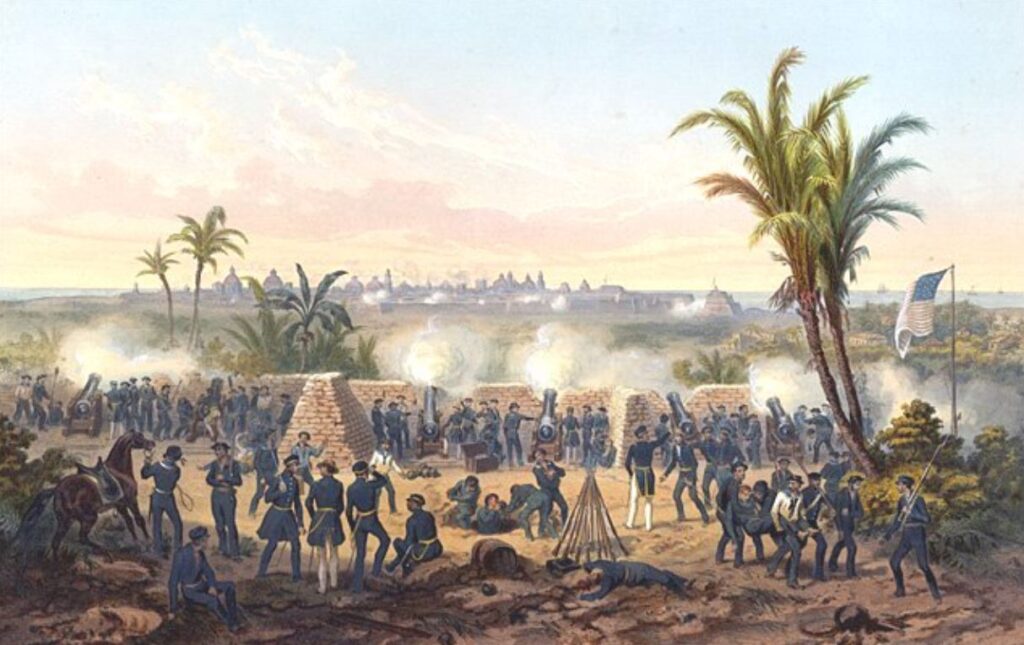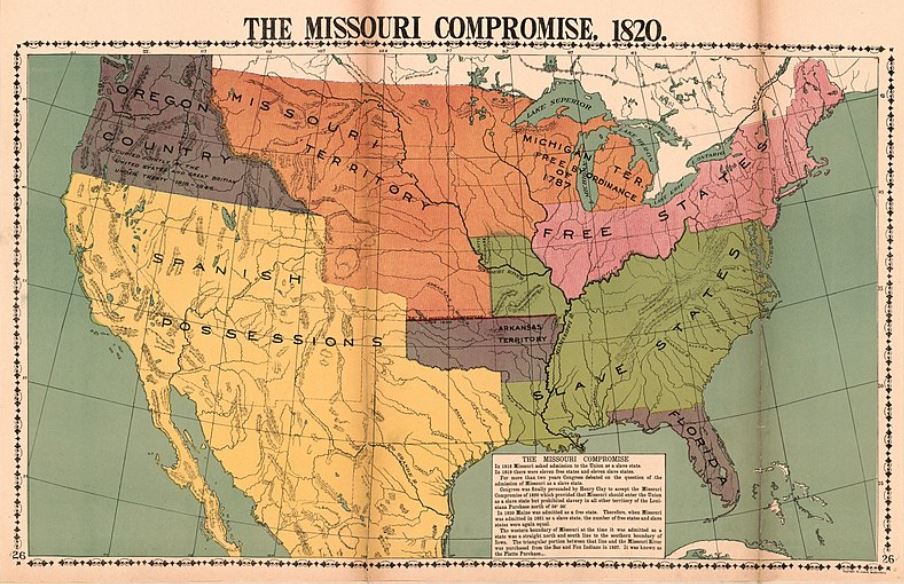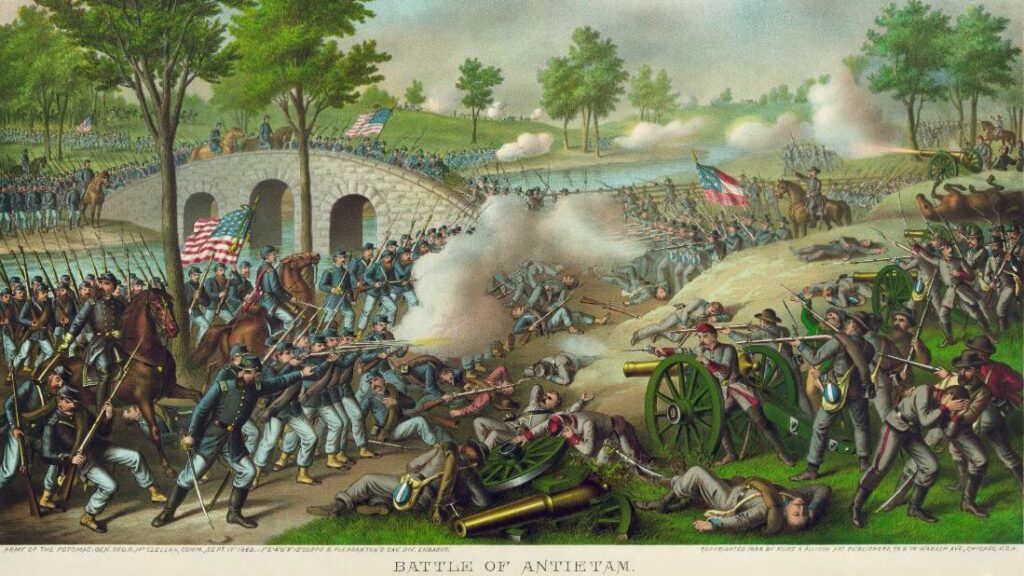Jefferson Davis was a controversial character, particularly during the dark days of the Civil War. As the President of the Confederate States of America, Davis played a central role in shaping the destiny of a nation torn apart by ideological conflicts and sectional strife.
Why did Jefferson Davis choose a path that led war? Jefferson Davis chose war to defend Southern states’ perceived right to secede and preserve the institution of slavery during the American Civil War.
This exploration aims to examine Jefferson Davis’s presidency, delving into the early influences that shaped his worldview, the political landscape that fueled the fires of secession, and the pivotal moments of the Civil War where decisions were made that would alter the course of history.
- 1. Why did Jefferson Davis choose a path that led war?
- 2. The Events that Triggered the Civil War
- 3. Jefferson Davis' Early Influences
- 4. Jefferson Davis' Role in the Mexican-American War
- 5. Slavery and Expansion Debates
- 6. Secession and the Formation of the Confederacy
- 7. Civil War Strategy and Leadership
- 8. Legacy of Jefferson Davis's Leadership
- Further Reading
1. Why did Jefferson Davis choose a path that led war?

While secession played a major role, Jefferson Davis’s decision to pursue war wasn’t driven by a single factor. It was a complex web of motivations, reflecting the broader anxieties and divisions simmering between the North and South:
Preserving Slavery: This was undoubtedly the core issue. Davis fiercely believed in protecting and expanding slavery, the South’s economic and social foundation. Lincoln’s election and anti-slavery stance threatened this way of life.
Defending States’ Rights: Davis was a staunch advocate for states’ rights. He viewed federal overreach as tyranny, and while secession had flaws, it seemed preferable to compromising on this principle.
Economic Anxiety: Southern planters feared declining economic power and political influence with a growing, anti-slavery North. War may have seemed like a way to secure their economic autonomy.
Nationalism and Honor: Many Southerners, including Davis, harbored a distinct cultural identity and felt the North disregarded their interests. Defending “their nation” against perceived Northern oppression fueled their resolve.
Miscalculation and Escalation: Both sides misjudged the other’s willingness to fight, which escalated tensions. Davis might have hoped for a quick victory or foreign intervention, leading him to believe war was a path to achieving Southern goals.
Personal Influence: While impossible to prove definitively, Davis’ personal experiences, like losing his first wife and children, might have shaped his approach to leadership and risk-taking, impacting his decision-making.
2. The Events that Triggered the Civil War
Following Lincoln’s election, which Southerners perceived as a threat to their way of life and the institution of slavery, several Southern states began to secede from the Union. South Carolina was the first to secede on December 20, 1860, followed by Mississippi, Florida, Alabama, Georgia, Louisiana, and Texas in early 1861.
These newly formed Confederate states believed that federal property within their borders rightfully belonged to them. This included forts, arsenals, navy yards, and other installations. These seizures were often met with little resistance. But the seizure of Fort Sumter proved to be the trigger for the Civil War.
Jefferson Davis, the president of the Confederate States of America, played a key role in the events leading up to and during the Battle of Fort Sumter, which marked the beginning of the American Civil War.
As President Davis preferred to give the Confederacy time to organize, he initially wanted to avoid a confrontation at Fort Sumter, which remained under Union control in Charleston Harbor.
To prevent an attack without his command, he appointed General Beauregard to oversee Confederate forces near Charleston. He also sent commissioners to Washington to negotiate the fort’s evacuation, but President Lincoln refused to meet them.
When Lincoln informed Davis of his intent to resupply Fort Sumter, Davis saw it as an act of aggression. This potentially pushed wavering states like Virginia into joining the Confederacy.
On April 8th, Davis convened with the Confederate Congress and ordered Beauregard to demand Fort Sumter’s surrender or its “reduction.”
After Major Anderson, the Union commander, refused to surrender, Beauregard began bombarding the fort on April 12th. After 34 hours, the Union surrendered.
This event ignited the American Civil War. Lincoln called for volunteers to suppress the “rebellion,” prompting several other states to secede and join the Confederacy.
3. Jefferson Davis‘ Early Influences

To understand the the motivations and decisions of Jefferson Davis during the Civil War, we must first explore his early influences and ideological struggles.
Born in a modest setting in Kentucky at the dawn of the 19th century, Davis’s upbringing was steeped in the cultural and societal dynamics that defined the American South.
Jefferson Davis’s early life was shaped by pro-slavery arguments that echoed through the Southern states. Raised in an environment where the institution of slavery was not only prevalent but deeply ingrained, young Davis was exposed to a narrative that portrayed slavery not just as an economic necessity but as a fundamental aspect of Southern identity.
His educational journey at St. Thomas Aquinas College in Kentucky served as a crucial backdrop for the formation of his values.
It was here that Davis was likely exposed to the pro-slavery arguments.
However, it was during a fateful trip to Nashville that Davis’s path intersected with a transformative figure – Andrew Jackson.

The encounter with Andrew Jackson, a prominent Southern leader and a staunch advocate of states’ rights, left an impression on Davis’s political consciousness.
During this time, Jefferson Davis’s beliefs began to solidify. The pro-slavery arguments to which he was exposed, coupled with the influence of figures like Jackson, laid the groundwork for a worldview that would later guide his actions as the leader of the Confederacy.
4. Jefferson Davis’ Role in the Mexican-American War

The Mexican-American War marked a key moment in 19th-century American history. This war marked a defining moment in Jefferson Davis’s journey.
His military and political actions during this conflict would not only shape his personal trajectory but also influence his perspective on conflict, laying the groundwork for the challenges he would face in the looming shadow of the Civil War.
Jefferson Davis at West Point
Jefferson Davis found himself at West Point, the renowned United States Military Academy. Here he was exposed to the rigors of military training and strategic thinking.
Jefferson Davis entered West Point in 1824 and graduated in 1828. He was known for being a good student and was admired by his instructors.
After graduating, Davis was commissioned as a second lieutenant in the United States Army. He served in the Black Hawk War and the Mexican-American War, and he was twice brevetted for gallantry in action.be built.
Davis’ experiences at West Point helped to shape him into the leader that he became. The discipline and rigor of the academy instilled in him a strong sense of duty and honor. His experiences in the military gave him valuable leadership skills and a deep understanding of warfare.
His time at West Point also helped to solidify his beliefs in the importance of states’ rights and the South’s way of life.
Leadership During the Mexican-American War
Davis’ leadership in the Mexican-American War earned him national recognition and political advancement.
His election to Congress did not hinder his desire to serve on the battlefield.
Davis earned praise for his personal courage and leadership in battle, particularly at Monterrey and Buena Vista. He was twice brevetted for gallantry and promoted to colonel.
He reportedly trained his Mississippi Rifles regiment diligently, equipping them with superior weapons and leading them to perform well in battle.
His experiences during the Mexican-American War, both on the battlefield and in the political arena, would significantly influence his perspective on conflict.
5. Slavery and Expansion Debates
During the mid-19th century, the United States grappled with the explosive issue of slavery and its expansion into newly acquired territories.
Jefferson Davis, deeply entrenched in the political arena, played a key role in shaping the discourse and decisions surrounding this divisive subject.
The Missouri Compromise in 1820

Before delving into Jefferson Davis’s specific role, it’s essential to understand the context.
The Missouri Compromise of 1820 attempted to quell tensions by maintaining a delicate balance between free and slave states. However, as new territories emerged from the crucible of westward expansion, the question of whether slavery would extend into these regions became increasingly contentious.
Frustration and Ideological Divisions: The Wilmot Proviso in 1846
The Wilmot Proviso further heightened tensions.
Introduced in 1846 by Congressman David Wilmot, it sought to prohibit slavery in the newly acquired territories from the Mexican-American War.
Jefferson Davis, representing Southern sentiments, viewed this as a Northern attempt to control and restrict the expansion of slavery.

Jefferson Davis’s opposition, along with other Southern congressmen, prevented the Proviso from becoming law.
However, the debate around the Proviso further highlighted the growing sectional tensions between North and South over slavery.
This controversy paved the way for future compromises like the Compromise of 1850, which temporarily postponed but ultimately failed to resolve the fundamental issue.
The Compromise of 1850
The Compromise of 1850, spearheaded by Henry Clay, aimed to settle sectional disputes arising from the newly acquired Mexican territories.

Davis and irate Southerners contended that the compromise did not adequately protect Southern rights. The opposition from both moderate and hardliner factions showcased the deep ideological divisions that threatened to tear the nation apart.
He particularly criticized California’s entry as a free state, the strengthening of the Fugitive Slave Act, and the slave trade ban in Washington D.C. These provisions, he argued, violated states’ rights and endangered the institution of slavery.
Davis used his platform as a Senator to rally against the Compromise, delivering fiery speeches and mobilizing opposition within the South. He even went so far as to challenge an Illinois representative to a duel over the issue.
Davis’s opposition to the Compromise solidified his reputation as a staunch defender of Southern interests and foreshadowed his future involvement in the Confederate movement.
Kansas-Nebraska Act and “Bleeding Kansas”
Jefferson Davis actively supported the Kansas-Nebraska Act (1854), which allowed popular sovereignty in new territories, potentially opening them to slavery, further escalating sectional tensions.
The violent clashes in “Bleeding Kansas” heightened animosities and laid bare the irreconcilable differences between the Northern and Southern states.
Formation of the Republican Party
The rise of the Republican Party, which opposed the expansion of slavery into new territories, further intensified Southern fears.
The election of Abraham Lincoln, a Republican, in 1860 without any Southern electoral votes, marked a turning point. Southern Democrats, divided in their support, saw secession as the only recourse to protect their interests.
6. Secession and the Formation of the Confederacy
![Constitution of the Confederate States of America [Jefferson Davis]](https://more-history.com/wp-content/uploads/2024/02/Constitution-of-the-Confederate-States-of-America.jpg)
By the late 1850s, the fabric of national unity had worn thin. The debate over slavery expansion, coupled with the contentious implementation of the Fugitive Slave Act, fueled tensions between Northern and Southern states.
As the divide deepened, the very idea of a unified nation began to unravel.
Jefferson Davis – Advocacy for State Sovereignty
Jefferson Davis, steeped in the Southern tradition of states’ rights, emerged as a fervent advocate for the autonomy of individual states. His political trajectory, marked by a steadfast defense of Southern interests, aligned seamlessly with the growing sentiment in the South that their distinct way of life was under threat.
Lincoln’s Election and Southern Secession
Abraham Lincoln’s election proved to be the catalyst for Southern states to act on their long-simmering grievances.
In the wake of Abraham Lincoln’s victory in the 1860 election, secession began to gathered momentum.
Jefferson Davis, who had long opposed any restrictions on its expansion, viewed Lincoln’s election as a direct threat to the South’s way of life.
Mississippi, like many other Southern states, called a convention to decide its future in the Union. Davis, a popular figure known for his fiery rhetoric and unwavering commitment to Southern interests, readily participated. Within the convention, he emerged as a powerful advocate for secession, urging his fellow delegates to break away from a government they saw as increasingly hostile to their values.
His passionate arguments, fueled by his deep convictions and political savvy, resonated with many. Mississippi ultimately voted to secede from the Union in January 1861, becoming the second state after South Carolina to do so.
Jefferson Davis as President of the Confederacy

With his home state now charting its own course, Davis’s own position became untenable. He could no longer serve in a government he actively sought to dismantle.
With a heavy heart, he resigned from the US Senate, his farewell speech echoing the South’s grievances and foreshadowing the impending conflict.
Returning to Mississippi, Davis immersed himself in the Confederacy.
His experience, reputation, and unwavering commitment to the Southern cause made him a natural choice for leadership.
In February 1861, he was unanimously elected the provisional president of the Confederate States of America, a newly formed nation built upon the pillars of slavery and states’ rights.
Thus, the man who had vehemently opposed Abraham Lincoln’s presidency now found himself leading a nation in rebellion against it. From fiery senator to reluctant secessionist, and finally to reluctant revolutionary, Jefferson Davis’s journey had mirrored the growing tensions that ultimately engulfed the nation in civil war.
Secession Showdown to Bloody Conflict: The Events Leading Up to the Civil War
The key events that pushed the North and South from secession to war.
November 1860: Abraham Lincoln, a vocal opponent of slavery, wins the presidency. Southern states, deeply invested in the institution, saw this as an existential threat.
December 20th, 1861: South Carolina throws down the gauntlet, becoming the first state to secede, citing states’ rights and the preservation of slavery.
February 1861: The dominoes fall. Six more states follow suit, forming the Confederate States of America, with Jefferson Davis at the helm.
Negotiations go bust: Attempts to find a peaceful resolution, like the Crittenden Compromise, crumble. Meanwhile, Confederate forces seize federal property within their claimed territory, raising the temperature even further.
Lincoln calls to arms: In response to the secession, Lincoln rallies the Union, calling for 75,000 volunteers to put down the uprising. This act fuels outrage in the South, hardening their resolve.
Virginia takes the plunge: Virginia, a crucial border state, throws its lot in with the Confederacy, tipping the scales towards war.
The Union tightens the screws: Lincoln imposes a naval blockade on Southern ports, aiming to cripple their economy and limit foreign support.
Miscalculations and mistrust: Both sides misread each other’s intentions and willingness to fight, leading to a fatal miscalculation. National pride and honor fueled the flames, making compromise seem like surrender.
April 12th, 1861: The unthinkable happens. Confederate forces fire on Fort Sumter in Charleston, South Carolina, marking the official start of the Civil War.
These events, woven together by years of ideological clashes, economic anxieties, and deep-seated cultural differences, ultimately plunged the nation into a devastating conflict.
7. Civil War Strategy and Leadership

As the United States plunged into the throes of Civil War, Jefferson Davis found himself at the helm of the fledgling Confederate States of America. His approach to war strategy and leadership would be scrutinized, with questions lingering about whether his decisions were driven by a genuine desire to protect his people or if other motivations shaped the course of the Confederacy.
Military Acumen and Strategic Vision
Jefferson Davis’ leadership during the Civil War remains a subject of debate, with his military acumen and strategic vision often at the center of the discussion. While he entered the conflict with a degree of military background and a clear vision, the realities of war proved far more complex.
Drawing on Experience:
- Military Background: Davis graduated from West Point in 1828 and served in the Black Hawk War and the Mexican-American War. These experiences instilled in him discipline, leadership skills, and an understanding of battlefield tactics.
- Strategic Vision: He envisioned utilizing the South’s geographical advantages, such as its vast territory and strong defensive positions like the Mississippi River, to wear down the Union army and ultimately achieve victory.
Challenges Emerged:
- Limited Experience: While Davis had battlefield experience, his leadership primarily focused on company and regimental levels. The complexities of commanding a large-scale army and coordinating diverse campaigns proved daunting.
- Static Defense: His initial strategy heavily relied on static defense, aiming to hold key positions and inflict heavy casualties on the Union. However, this strategy proved inflexible and failed to adapt to the Union’s changing tactics and superior resources.
- Micromanagement: Davis’ tendency to micromanage military operations, often interfering with his generals’ plans, led to confusion and hindered the effectiveness of his strategies.
- Overconfidence: He initially overestimated the South’s military capabilities and underestimated the Union’s resolve and resources, leading to strategic miscalculations.
Scrutiny and Debate:
- Military Losses: As the war progressed, the Confederacy suffered significant military defeats, raising questions about the effectiveness of Davis’ strategies.
- General Clashes: His clashes with prominent generals like Robert E. Lee, while highlighting strong personalities, also exposed potential shortcomings in communication and collaboration.
- Shifting Interpretations: Historians continue to debate the extent to which Davis’ leadership contributed to the Confederacy’s defeat, acknowledging both his strengths and weaknesses within the broader context of the war.
Davis’s role in the lead-up to Gettysburg included strategic decision-making, such as endorsing Lee’s invasion plan. The failure of this campaign resulted in a significant loss of Confederate manpower and resources. Questions arose about Davis’s influence on military strategy and whether alternative approaches could have yielded different outcomes.
While he possessed undeniable leadership qualities and a clear vision, his strategies were hampered by inflexibility, miscalculations, and internal conflicts.
Challenges in Unifying Southern Command
Jefferson Davis’ leadership during the Civil War was fraught with challenges, and one of the most significant was unifying the Confederacy’s military command.
Clashing Personalities and Agendas:

- Strong-Willed Generals: The Confederate army boasted talented commanders like Robert E. Lee, Joseph Johnston, and P.G.T. Beauregard, each with distinct personalities, strategic preferences, and personal ambitions. These strong wills often clashed with Davis, leading to power struggles, conflicting strategies, and missed opportunities for unified action.
- Political Interference: Governors and state legislatures frequently exerted pressure on military decisions, seeking to prioritize the defense of their own territories over broader strategic goals. This political interference further complicated and fragmented the chain of command.
The Structural Divide:
- Lack of Centralization: Unlike the Union, the Confederacy lacked a unified military command structure. While Davis held the title of Commander-in-Chief, he often delegated heavily to field commanders, leading to confusion and inconsistencies in strategy and execution.
- Inadequate Communication: Information flow between Davis and his generals was slow and cumbersome, hindering effective coordination and timely responses to changing battlefield situations. Contributing factors included limited infrastructure, inefficient communication systems, and personal rivalries among officers.
The Consequences of Disunity:

- Missed Opportunities: The lack of unified command arguably led to missed opportunities for decisive victories. For example, the Battle of Antietam might have ended differently with better coordination between Lee and other Confederate commanders.
- Logistical Nightmares: Inefficiencies in resource allocation and logistics plagued the Confederate army throughout the war. The lack of a unified command structure contributed to these difficulties, making it harder to effectively transport supplies and manpower to where they were needed most.
- Morale Decline: The constant infighting and conflicting orders eroded morale among both officers and soldiers. Soldiers often felt confused and abandoned, further impacting their fighting spirit.
Davis’ Role in the Conundrum:
- Micromanagement: While delegating heavily, Davis also exhibited tendencies towards micromanagement, interfering with generals’ plans and contributing to the confusion. This eroded trust and further complicated unified action.
- Personality Clashes: His own personality, prone to stubbornness and suspicion, arguably exacerbated tensions with some generals, especially those with strong convictions of their own.
- Limited Military Experience: Although a West Point graduate, Davis’ actual battlefield experience as a commander was limited. This might have hindered his ability to effectively manage and coordinate experienced generals.
The challenges of unifying Southern command under Jefferson Davis proved to be a significant factor in the Confederacy’s ultimate defeat.
Economic Challenges and Resource Management
The Confederacy’s path to independence was a constant struggle against economic limitations.
Jefferson Davis, as the Confederate President, faced the unenviable task of sustaining a war effort with a fledgling nation’s scarce resources.
The Harsh Reality:
- Limited Industrial Base: Compared to the North’s robust industrial infrastructure, the South heavily relied on agriculture and lacked the capacity to produce vital war materials like weapons, ammunition, and uniforms. This meant dependence on imports and limited options for domestic production.
- Financial Woes: The Confederacy lacked a strong financial system and struggled to raise funds through taxation due to limited resources and widespread resistance. This led to heavy reliance on printing paper money, causing rampant inflation that eroded the value of currency and impacted the populace.
- Trade Blockade: The Union’s naval blockade crippled Southern trade, further limiting access to essential resources and hindering exports, the lifeblood of the agricultural economy.
Davis’ Balancing Act:
- Centralized Control vs. States’ Rights: Davis advocated for increased government control over the economy, aiming for centralized resource allocation and production. However, this clashed with the South’s strong belief in states’ rights, leading to resistance and inefficiencies.
- Military vs. Civilian Needs: Prioritizing the war effort meant diverting resources away from civilian populations, leading to shortages of food, clothing, and other necessities. This caused discontent and hardship among the populace, eroding support for the war.
- Impressment and Taxation: Confederate policies like impressment (seizing resources and manpower) and increased taxation further strained relations with the citizenry, raising questions about fairness and effectiveness.
The Fallout and the Debate:
- Economic Collapse: By the war’s end, the Confederacy’s economy was in ruins, with rampant inflation, food shortages, and widespread destruction. Critics argue that Davis’ policies, like excessive printing of money and prioritizing military needs over civilian welfare, contributed to this collapse.
- Lost Support: The economic hardships faced by the populace undoubtedly impacted their morale and support for the war effort. Historians debate whether Davis’ economic management decisions alienated the people and contributed to the Confederacy’s ultimate defeat.
Conscription Issues and Dissent
Jefferson Davis’s decision to implement conscription in the Confederacy during the Civil War proved to be a double-edged sword.
While it bolstered the dwindling ranks of the Confederate army, it also ignited a firestorm of dissent that challenged his leadership and exposed deep divisions within Southern society.
Davis, previously a staunch advocate for states’ rights, now found himself imposing a federal mandate upon individual states. This hypocrisy fueled accusations of betraying his principles and stoked resentment among those who believed in limited government intervention.
The conscription laws exempted certain groups, such as large plantation owners and government officials, creating perceptions of unfairness and class privilege. This fueled resentment among poorer citizens and those who felt the burden of war unfairly distributed.
Widespread draft evasion and desertion became major problems for the Confederacy. Men fled to remote areas, joined guerrilla bands, or even switched sides to avoid conscription. This hampered military effectiveness and further strained resources.
Handling of Union Prisoners
The treatment of Union prisoners of war remains a dark stain on the Confederacy’s legacy, and Jefferson Davis’ leadership in this realm is particularly controversial.
Union prisoner camps, particularly Andersonville, suffered from extreme overcrowding, leading to rampant disease, malnutrition, and unsanitary conditions. Thousands of prisoners perished due to neglect and preventable illnesses.
While aware of the dire conditions, Davis allegedly did little to alleviate them, leading to accusations of deliberate neglect and potential war crimes. His justifications often focused on resource limitations, but critics argue alternative solutions were present.
Personal Tragedies and Impact on Leadership
The personal tragedies Davis endured, including the death of his wife, Sarah Knox Taylor, could have influenced his decision-making. Some scholars posit that these personal losses may have shaped his approach to leadership and the war effort.
The death of his first wife, Sarah, in 1862, just months after the war began, was a devastating blow. He later described it as “the bitterest cup of my life.” Some argue that these tragedies fueled Davis’s resolve and determination to win the war, channeling his grief into a fight for the Confederacy’s cause.
Personal pain can lead to withdrawal and depression, and some suggest Davis became increasingly isolated and emotionally distant, impacting his ability to connect with others and navigate political complexities.
Failed Diplomacy and European Support
The Confederacy’s fate wasn’t sealed solely on the battlefield.
Jefferson Davis’ attempts to woo European powers into recognizing the Confederacy and providing critical economic and military support proved largely unsuccessful.
Dreams of Recognition:

- Cotton Diplomacy: The Confederacy initially believed its “King Cotton” – a vital industrial resource for Europe – would guarantee recognition and support. However, overestimating Europe’s dependence and underestimating Union resolve proved costly.
- Appealing to Shared Ideals: Davis hoped to resonate with European powers wary of American democracy by portraying the Confederacy as a champion of states’ rights and limited government. While some sympathized, ideological alignment wasn’t enough to overcome strategic concerns.
Jefferson Davis’ overreliance on “King Cotton” diplomacy, misreading of European interests, and potential diplomatic missteps undoubtedly contributed to the failure to secure crucial foreign support, ultimately impacting the war’s outcome.
8. Legacy of Jefferson Davis’s Leadership
Jefferson Davis, the first and only President of the Confederate States of America, remains a polarizing figure. His role in the Civil War ignited deep divisions that endure even today.
Jefferson Davis’ decision for war wasn’t just about secession rights, though that played a major role. It was a complex web of factors:
- Protecting Slavery: He deeply believed in protecting and expanding slavery, the South’s economic and social foundation. Lincoln’s election and anti-slavery stance threatened this way of life.
- States’ Rights: He was a staunch advocate for states’ rights, viewing federal overreach as tyranny. Secession, however flawed, seemed preferable to compromising on this principle.
- Economic Anxiety: Southern planters feared declining economic power and political influence with a growing, anti-slavery North.
- Nationalism and Honor: Many Southerners, including Davis, harbored a distinct cultural identity and felt the North disregarded their interests. Defending “their nation” fueled their resolve.
As the war progressed, Confederate setbacks mounted, prompting reflections on Davis’s leadership. The surrender at Appomattox marked the end of the Confederacy, and Davis’s legacy would forever be entwined with the outcome of the war.
The economic challenges, public dissatisfaction, and anti-war sentiments collectively cast a shadow on Jefferson Davis’s leadership. As the strain on the Confederate economy intensified, Davis faced the daunting task of managing both the material needs of the war and the morale of the Southern populace. The weight of these challenges tested his ability to navigate the intricate balance between military exigencies and maintaining public support.
While some view him as a defender of Southern principles, prioritizing the interests of his people in the face of what he perceived as Northern aggression, others critique his decisions, especially in strategic matters, as contributing to the prolonged conflict and ultimate demise of the Confederacy.
Jefferson Davis’s legacy is a nuanced narrative that continues to be dissected, debated, and contemplated in the ongoing exploration of America’s tumultuous past.
Further Reading
If you enjoyed this article, you may be interested to read more about the American Civil War events, or perhaps read about the how the North won the war or what would have happened had the South won. Read here to find out more about the bloodiest battles of the Civil War. Read here for more general American history.







